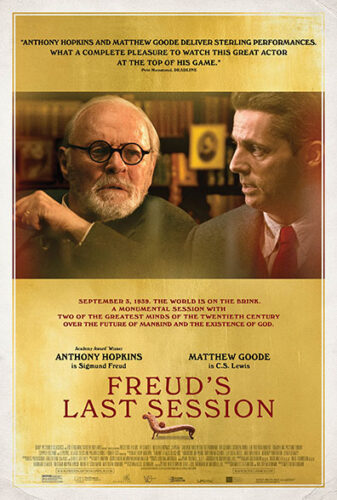
By Rusty Wright —
(This article first appeared on WashingtonExaminer.com.)
Harvard psychiatrist Armand Nicholi taught a popular course on “The Question of God,” examining Sigmund Freud’s atheism and C.S. Lewis’ faith. Now a related Sony theatrical film imagines that the two met in London shortly before Freud’s death. The result is a fascinating historical drama probing their intellectual, emotional, psychological, and spiritual development. Anthony Hopkins is masterful as Freud. Matthew Goode plays Lewis.
Nicholi’s course inspired a book, television series, and stage play, from which this film derives. Amid Nazi advances, Freud moved from Vienna to London in 1938. Lewis taught at Oxford. There is no record of them ever meeting, but the film is a valuable tool to show how their beliefs and psyches might have weathered careful mutual scrutiny … and to understand two competing worldviews, atheism and theism.
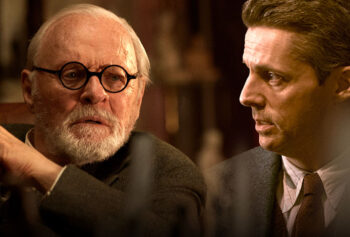
Personal pain
The father of psychoanalysis had many reasons for rejecting God. The film depicts a common one, disillusionment over disappointing life circumstances. He lost his daughter Sophie and favorite grandson to illness. In the film, he shows their pictures to Lewis, expressing his frustration.
“How could God allow this?” is a question many raise when tragedy strikes. I certainly have. “Either God’s not loving, or not all powerful, or doesn’t exist.”
Freud wrote, “…it was a senseless, brutal stroke of fate that took our Sophie from us… we are … mere playthings for the higher powers.”
Antisemitism, but a bright spot
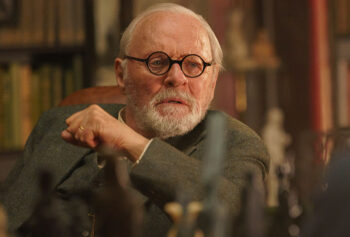
Rampant antisemitism in his native Austria – Freud was raised Jewish – also influenced him. In 1937, he told an Austrian colleague that his “true enemy” was not the Nazi’s but “religion,” the Christian church. Religion to him was wish fulfillment that humans invented to meet their security needs.
Freud’s life had some spiritual bright spots (which the film omits, perhaps for time reasons). Most notable was his 30-year friendship with Swiss pastor Oskar Pfister, about which I’ve written more elsewhere.
Freud felt Pfister was “a remarkable man… a true servant of God, …[who] feels the need to do spiritual good to everyone he meets. You did good in this way even to me.”
A skeptical youth

Born in Ireland in 1898, C.S. Lewis lost his mother at age 9. By age 17, he declared himself skeptical about all religions. World War I battlefield experiences affected him deeply. Reading and Oxford friendships with J.R.R. Tolkien and others prompted him to consider faith.
In 1929, he says, “I gave in, and admitted that God was God, and knelt and prayed: perhaps, that night, the most dejected and reluctant convert in all England.” He became a widely respected novelist, Christian apologist, and broadcaster. His The Problem or Pain aims to help unravel God-and-suffering complexities.
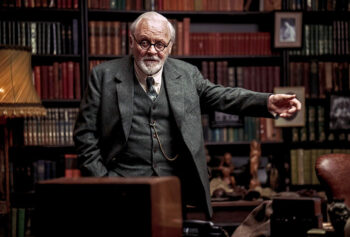
His argument that Jesus’ claims to deity make him either liar, lunatic, or Lord has been broadly influential: “A man who was merely a man and said the sort of things Jesus said would not be a great moral teacher. He would either be a lunatic — on the level with the man who says he is a poached egg — or else he would be the Devil of Hell. You must make your choice. Either this man was, and is, the Son of God, or else a madman or something worse….”
Meeting at Freud’s London home
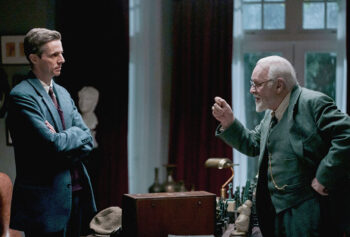
Freud’s London home still exists as a museum. The film’s portrayal of Lewis taking the train from Oxford to Freud’s London home reminded me fondly of my identical research journey.
So, there you have it: A strident, wounded atheist (with a soft spot for at least one Christian). A reluctant convert who believes in Jesus as God. They meet at the former’s home. Fasten your seat belt for 108 minutes of skillfully crafted intellectual and psychological drama.
Viewers familiar with Freud and Lewis will recognize numerous situations, people, and arguments in the film. Others can discover from the dialogue what drove these two intellectual icons.

Rated (USA) PG-13 “for thematic material, some bloody/violent images, sexual material and smoking.”
www.sonyclassics.com/film/freudslastsession Opens wide in the USA January 19, 2024.
International release dates (North America, Europe, Asia, Australia)
Rusty Wright is an author and lecturer who has spoken on six continents. He holds Bachelor of Science (psychology) and Master of Theology degrees from Duke and Oxford universities, respectively. His MTh dissertation is on Freud’s reaction to Christian faith. www.RustyWright.com
Copyright © 2024 Rusty Wright
# # #
Editors: High res images available here, here, here, here, here, here, and here. You are welcome to republish this article with author- and source-website attribution (i.e., please link back to this website).



